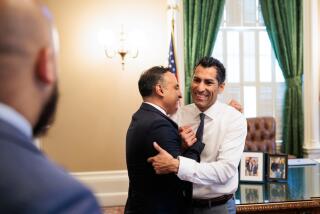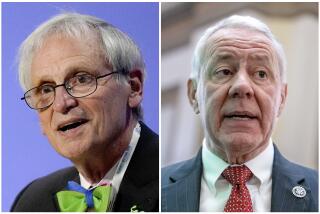Searching for Health Care Solutions
- Share via
* I am responding to the commentary on health care by Congressman (Christopher) Cox, (“Congress and the People Should See the Final Bill Before a Vote,” July 3). Cox feels that Congress, as well as the nation, should have ample time to study the revised bill before a final vote is taken. This is a reasonable request. How does it look historically?
When I was a youngster, I heard debates on the lack of health care for Americans. Now I am a grandmother, and the majority of Americans are still finding themselves without, or with dubious health care.
Is health care reform happening too fast, Mr. Cox? For the status quo, any change is happening too fast. I suggest that all members of (Congress) be deprived of their health care benefits until they have taken the time to carefully study the final draft of the bill and can vote in good conscience. This may speed up the passing of a universal health plan in my lifetime.
TRUDY TOPIK
Laguna Beach
* Rep. Cox, in his Commentary on Health Care (July 3) writes that neither he nor his constituents will be given enough time to understand all of the complexities of the National Health Care Reform Act before Congress votes on it. It is striking how closely Cox echoes the anguish of Harry and Louise in the insurance company ads.
JOHN FERGUSON
Orange
* Congressman Cox knows that while he complains about “dauntingly complex” health care reform legislation, it is his party’s rigid rejection of single-payer universal health care that has (made) health care reform (complex.)
Health care reform legislation, with provisions for the federal government to pay for all privately provided medical services, could be very simple and politically viable. Nearly all employers, health care providers (including doctors), senior citizens and veterans, as well as local and state governments could readily understand and champion a single-payer medical care initiative. Clearly, a majority of working people would welcome a time when changing jobs, early retirement, layoffs, and pre-existing conditions would no longer restrict health care access.
How would the federal government finance single-payer medical care? The most straightforward, least-costly way is through a payroll-deducted tax. As an incentive for individuals to reduce medical costs, the final individual medical tax obligation could be computed at the annual income-tax filing where the total medical tax withheld would be adjusted by the total medical payments for the year. For example: Someone with little or no medical expense would receive a generous tax refund; whereas, someone with substantial medical expense would not receive any refund.
Predictably, insurance companies will oppose any legislation that affords medical care for every person in the United States who needs it. They will argue that escalating costs would quickly overwhelm any cost savings and that any government payment of medical services is a form of socialized medicine. Everyone should remember, however, that it is the insurance companies that are responsible for a health care system that consumes one-seventh of our gross domestic product.
While Congressman Cox enjoys an excellent health care benefit plan, basically paid for by taxpayers, he complains about the difficulties of legislating health care reform. He should recognize that, should he become uninsurable, single-payer health care would become an urgency overshadowing all imaginable legislative difficulties.
WAYNE KING
Orange
More to Read
Sign up for Essential California
The most important California stories and recommendations in your inbox every morning.
You may occasionally receive promotional content from the Los Angeles Times.













